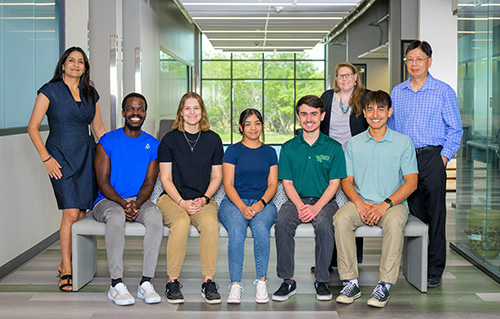Monday, August 7, 2023
 DENTON (UNT), Texas — Researchers at the University of North Texas College of Engineering are leading a new consortium to further the science and applications of emerging
semiconducting materials toward electronic, photonic and sensing technologies. These
technologies will help advance national security capabilities, while also training
a diverse workforce in these key disciplines, through funding received from the U.S.
Department of Energy’s (DOE’s) National Nuclear Security Agency (NNSA).
DENTON (UNT), Texas — Researchers at the University of North Texas College of Engineering are leading a new consortium to further the science and applications of emerging
semiconducting materials toward electronic, photonic and sensing technologies. These
technologies will help advance national security capabilities, while also training
a diverse workforce in these key disciplines, through funding received from the U.S.
Department of Energy’s (DOE’s) National Nuclear Security Agency (NNSA).
The Consortium on Sensing, Energy-efficient Electronics, Photonics with 2D Materials and Integrated Technologies (SEEP-IT) will receive $1 million annually over the next five years, totaling $5 million, specifically from the DOE-NNSA Minority Serving Institution Partnership Program.
“If we want to push our technology forward to remain competitive economically and safeguard our national security, we need to explore emerging semiconductors that offer new functionalities not possible with conventional materials,” said UNT PACCAR Professor of Engineering Anupama Kaul. “This consortium will help drive innovation with our team members across disciplines simultaneously working on different components of this research.”
Kaul is serving as the principal investigator of SEEP-IT and is leading a team of 15 faculty and scientists collaborating in the consortium. Other university research leads include Weidong Zhou, a Distinguished University Professor in electrical engineering at the University of Texas at Arlington with expertise in photonics and optoelectronics and Mansour Mortazavi, vice chancellor for research at the University of Arkansas-Pine Bluff with expertise in optics and laser science and technology. SEEP-IT also is actively working with the DOE’s Argonne National Labs and Sandia National Labs. These labs receive a separate budget through co-funding from DOE-NNSA-MSIPP, bringing the total funding for SEEP-IT at $7.45 million, including the academic and national labs partners.
Kaul holds joint appointments in the Departments of Materials Science and Engineering and Electrical Engineering. To date, she has earned nearly $12 million in funding from federal and other agencies as principal investigator for her research. Kaul’s current research is heavily entrenched in low-dimensionality materials. These include 2D materials, which offer promising platforms for electronics, photonics, sensors and flexible electronics using additive manufacturing approaches and solar cells, through the strong light-matter interactions these materials demonstrate.
Through SEEP-IT, Kaul is working closely with co-PI Yuankun Lin, a professor of physics at UNT. Lin conducts research in laser optics and photonic crystals and has mentored many students from underrepresented groups who are now working in leading defense firms. Others from UNT include co-PI Pamela Padilla, vice president for research and innovation, who is playing a key role in developing recruitment strategies to engage a diverse student body, having served as past president of the Society for the Advancement of Chicanos/Hispanics & Native Americans in Science (SACNAS).
“It is essential that UNT students from diverse backgrounds have an opportunity to engage in research that creates new technologies and is foundational to economic development and national security,” Padilla said. “This grant facilitates student access to research opportunities and mentors within academia and the national labs.”
The science drivers for SEEP-IT include identifying ways in which ionizing radiation detection can be furthered using silicon photonics and 2D materials. The consortium also will develop new sensor technologies including in flexible formats, studying light-matter interactions and lasing in the quantum limit, as well as twisted opto-electronics.
“The capabilities of NNSA’s various offices in counterproliferation will be important guides for us,” Kaul said. “We are uniquely positioned with the expertise to address key challenges for the NNSA using science and technology that will emerge from our research at UNT and work from our collaborators. Knowing our research under SEEP-IT will have significance to fulfill an important national security need is highly motivating and a privilege.”
Equally important for SEEP-IT is the prioritization of educational and outreach initiatives to recruit students, particularly from underrepresented groups in STEM, engagement with the community, along with internship placement for students at national labs. As a principal investigator, Kaul has led recent STEM initiatives through other Department of Defense programs, which have had a regional impact in North Texas.
“SEEP-IT will help inspire, recruit and retain U.S.-based, undergraduate and graduate students and those who are underrepresented in the STEM fields to provide them with exceptional opportunities in cutting-edge research of national significance,” said Vijay Vasudevan, chair of UNT’s Department of Materials Science and Engineering.
Kaul said a diverse STEM workforce trained in working with semiconductors will be necessary to tackle the complex problems in this field.
“This will help drive the nation’s economy by developing the STEM pipeline to fulfill the great demand we have for engineers and scientists in the U.S., while also strengthening our national security,” Kaul said.
UNT News Service Phone Number: (940) 565-2108
Media Contacts:
Amanda Lyons
Amanda.Lyons@unt.edu
940-565-2943
From UNT News - Engineering